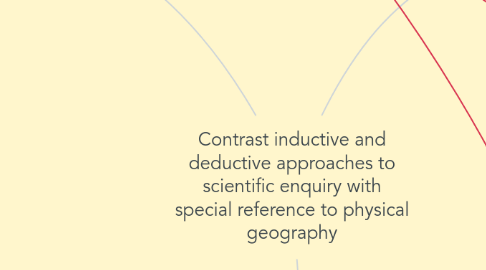
1. Induction
1.1. Problem of verification
1.2. problem of induction
1.3. problem of theory-dependent observations
1.4. Bacon and rationalists
1.5. important in historical sciences
1.6. Ruling theories and working hypotheses
1.6.1. R.L. Railsback: chamberlin encapsulation for students
1.7. verification
1.8. knowledge expanding; conclusions contain more information than premises
1.9. characteristics of inductive arguments
1.9.1. use specific cases to arrive at general principles
1.9.2. premises provide some support for the conclusion
1.9.3. typically neither valid or invalid but strong or weak
1.9.4. not "erosion proof" - new premises may completely undermine a strong inductive argument
1.10. the legitimacy of non-deductive reasoning
1.10.1. hypothetico-deductive account requires non-deductive reasoning
1.10.2. auxiliary hypotheses
1.10.2.1. theories of insrtumentation
1.10.2.2. theories of error
1.10.2.3. theories of experimental design
1.10.3. glass tumbler example
1.10.3.1. laws
1.10.3.2. initial conditions
1.10.4. selection of a theoretical claim from infinite, large but finite or even from two possibilities is non-deductive
1.10.5. distribution of initial probabilities
1.10.6. Hempels conclusion
1.10.7. post-positivist accounts of science (Khun, Feyerabend, Hanson and Lakatos
1.10.7.1. all we can have knowledge of via the senses is interpreted reality
1.10.7.2. there is no theory independent observation language
1.10.7.3. feyerabend
1.10.7.3.1. since scientific reasoning is non-deductive and there is no theory independent observation language, science is irrational
1.10.8. it is argued the logic of discovery is non-deductive
2. Deduction
2.1. Popper
2.2. chamberlin
2.2.1. MWH
2.3. Many geographers adopt an 'softer' version of deduction
2.4. preference justification vs. a theories justification
2.5. Multiple working hypotheses
2.5.1. proxy indicators
2.5.2. why do birds sing?
2.5.2.1. attract mate
2.5.2.2. warding off rival males
2.5.2.3. stimulates the birds
2.5.3. R.L. Railsback: chamberlin encapsulation for students
2.5.3.1. discovery of breccia
2.5.4. appears little used
2.5.5. ' a chimera ' - J.G. Johnson
2.5.5.1. few use MWH
2.5.5.2. "unrealistic"
2.5.5.3. "outmoded"
2.5.5.4. "to the mind of it's author"
2.5.5.5. argues that 'good scientists' already practice weighting possible answers and grant 'predictive value' to prominent hypotheses
2.5.5.6. favours the working hypothesis approach
2.5.5.6.1. 'realistic and ordinary'
2.5.5.7. Railsback's comments defend MWH
2.6. problem of the origin of theories
2.7. problem of the concept of corroboration
2.8. falsification
2.9. no certainty
2.9.1. corroboration
2.9.1.1. "corroboration appraisals are no more than historical reports about past performance"
2.9.1.2. comparative reliability
2.9.1.2.1. "decision maker seeks reliability in terms of which which hypothesis is more worthy of being relied upon"
2.9.1.3. "although we cannot justify a theory (...) we can sometimes justify our preference for one theory over another; for example if its degree of corroboration is greater" - Popper
2.10. no ad-hoc changes
2.11. Lilla Oresjon
2.11.1. land use or acid deposition - the competing hypotheses to surface water acidification
2.11.1.1. diatom flora
2.11.1.2. analysis of chrysophate scales and cladocera and chironomid remains
2.11.1.3. measurement of the concentration of Ph, Zn, Cu and S
2.11.1.4. spheroidal carbonaceous particles
2.11.1.5. polycyclic aromatic hydrocarbons
2.11.1.6. hard isothermal remanence
2.12. truth preserving; conclusions contain less information than premises
2.13. deductively valid argument is
2.13.1. truth preserving
2.13.2. erosion proof
2.13.3. all or nothing
2.14. Lake acidification in Galloway
2.14.1. possible causes
2.14.1.1. acid precipitation
2.14.1.2. heathland regeneration
2.14.1.3. afforestation
2.14.1.4. post - glacial natural acidification
2.14.2. long term change and afforestation proved as non valid
2.14.3. pollen analysis
2.14.4. diatom analysis
2.14.5. heavy metal records
2.14.6. pH levels

